House Money
From Route2FI substack
There are tradeoffs for everything.
Are you familiar with the idea of house money? When playing with house money, gamblers are more likely to take a bigger risk with their winnings than they were with their starting balance due to a cognitive bias in gambling. It appears as though the house, or the casino, still owns their profits rather than them.
A quick example, let’s say you had $10k, and you doubled that on trading $DOGE. You now have $20k. Studies have shown that people are less careful with the house money ($10k) than their initial capital. This makes sense, and it is also a fallacy I am going in often.

When it comes to house money, we are less frugal than when it comes to our hard-earned income. We're willing to let go of the house money as it came to us effortlessly. Naturally, this is nonsensical since money is just money, no matter where it originates from.It makes no difference if you earn or win a dollar. That dollar has the same literal worth, but its ascribed value and consequent risk tolerance may vary.
But does this cognitive defect have a benefit? In my opinion, yes. It gives us the freedom to take on more risk than we otherwise would, perhaps yielding bigger rewards.
You are willing to bet bigger with money you earned easily (because they came easily).What would happen if we used the same prejudice with a different, more significant currency? What if we used time as an example?
Actually I tweeted about this the other day: https://x.com/Route2FI/status/1839230951861211461

So let’s say you know that you will die when you are 80.
If you’re 25, you have 55 years left. If you’re 40, you have 40 years left, etc.
Now, let’s apply house money to time.
Let’s say someone gave you an extra year right now.
You could freeze time, pause your life and just use this year exactly how you wanted.
So it would be 80 + 1 year.
Since you got extra this year (would you spend it differently?).
I know that if I weren’t retire myself already, I’d definitely use this year to travel, pursue other interests, start a biz because you enjoyed it ++, basically everything I couldn’t do/or have time for while working a 9-5. Just exploring without any pressure to necessarily earn money.
Perhaps your goals are different from mine, but I find it difficult to imagine that if you were granted one more year, you would utilize it to amass riches or prestige.
The wisest use of time in this situation would be to engage in the types of things that many of us wouldn't allow ourselves to commit to during "regular" time.
This brings me further to the question: if you know exactly what you’d like to do and this is what is making you happy, then why aren’t you doing these things right now? What are you so afraid of? Is anything really stopping you, or is it just in your head?
The perception of time
Time is something we can't "win" back, so we have to manage it carefully.
We are told that we should perform well academically in order to gain admission to a reputable university where we can study subjects that will enable us to be hired in lucrative positions.
If we get bored, we can simply return to school to earn a master's degree, which will enable us to earn even more money. However, we never consider stopping this cycle to discover our true passions because doing so would make it more difficult for us to continue running towards the arbitrary finish line that we have been instructed to reach.At least this is something many can relate to in the Western world.
A significant portion of our teenage and early adult years seem to be devoted to aiming our arrow at a posh corner office with windows in a skyscraper, with little to no thought given to whether or not this would make us feel like we haven't squandered our time.We believe that by using our time in this way, we are not taking any risks.
But isn’t this a risk too? Living your life pursuing other people’s goals, but not yours…isn’t that the biggest risk of them all?
We’re spending our precious currency of time on things we might not even value. So we continue optimizing for money, productivity, and success to the point where we are willing to give up time in exchange for it, regardless of whether or not these things are earned as a product of something that truly speaks to us.
This is because collecting these things is a socially acceptable indicator of success, while collecting experiences is not.
We’d rather give up our time in exchange for a ~potentially~ valuable currency than spending it on the unknown. Exploration is not an option, because exploring for its own sake isn’t considered productive enough in our society.
What this creates is a systematic erasure of wonder and curiosity from our lives. It destroys our sense of play.

In reality, none of us know how much time we have. So, wouldn’t it serve us all well to treat a year (or two or five) as if it were house money? A little extra. Something we didn’t earn, but got to spend anyway.
Until next time, think about the tweet below.

Do you own your own time? Or do you belong to your boss?
Don’t be afraid to use some of your house money (time) to figure out what you really want.
Disclaimer: The content of this article solely reflects the author's opinion and does not represent the platform in any capacity. This article is not intended to serve as a reference for making investment decisions.
You may also like
2024 Crypto Developer Report SummaryExecutive Summary

Digital Veblen Goods and Fees

Musings on the Future of Actually Smart Wallets

Bitwise CIO: Биткойн может достичь $200 000 без краха доллара

